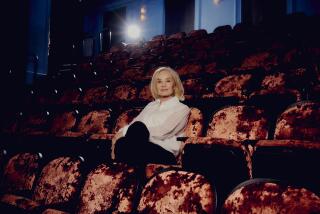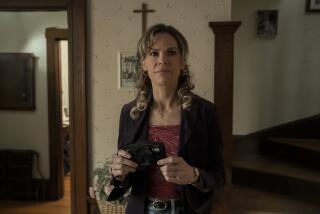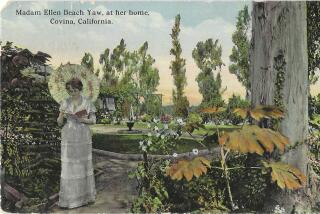A Star is Finally Born--in Her 90s
- Share via
All her life, Ida Engel wanted to be a star. Ever since they made motion pictures in her downtown neighborhood.
The neighborhood children on their way to study Hebrew at the Olive Street Temple couldn’t help but watch.
There was Charlie Chaplin, mesmerizing with his cane-twirling antics, and Mary Pickford, gorgeous in her curls. There was lots and lots of silence; this was before movies came with sound.
This city’s history is filled with the stories of people who dreamed of hitting it big in entertainment, only to have their dreams die a quiet, common death.
That is not Engel’s story. Over the years, the 96-year-old great-grandmother became a minor star--the hit of local synagogues, senior citizen centers and family gatherings. Although the Temple Street neighborhood where she lived as a child no longer exists, her desire to entertain survived through the Great Depression and two world wars.
Then one day she was discovered in true Hollywood fashion.
“I’m making commercials now,” said Engel, who got her big break at the age of 90. “ . . . Everybody calls me a star because of these commercials.”
Engel and her Russian immigrant family moved to Los Angeles in 1907 from Winnipeg, Canada, when she was 4 years old. In those days, the Temple Street neighborhood was one of the hubs of Jewish life in the city.
The family lived on Victor Street. Their home was a first stop for immigrants fresh from Europe and for migrants from the East Coast. Engel’s mother, Bessie Mandel, was a member of the Jewish Ladies Aid Society and her home was open to everyone in need. A newcomer to the city could stop by unannounced and be offered a bath, a meal, money for a room at a hotel--or sometimes a place to sleep in the basement.
“These guys used to come on the railroad from New York,” Engel said. “They’d come to my mother’s house. She’d sit them down at the table. She’d even give them my father’s clothes.”
The president of the society, Engel said, was neighbor Anna Wapner, the grandmother of someone who would make a name for himself in entertainment: Judge Joseph A. Wapner of the TV show “People’s Court.”
Engel’s father, Harry Mandel, owned a clothing store on downtown’s Main Street and learned Spanish from his Mexican American customers. Her brother became completely fluent, and wrote a movie script, she recalled, in Spanish.
That was at time when people downtown never locked their doors, streetcars rattled through the city, and the ice man made deliveries with a horse and buggy.
Engel attended Alpine Street Elementary School, Central Junior High School and Polytechnic High School. The child of Orthodox parents, she also studied Hebrew with a rabbi at the Olive Street Temple.
During the first World War, Engel was anxious to do her part.
“I used to make socks and scarves for the soldiers,” she said. “When I was 15 I went to the Red Cross and learned how to knit. My mother taught me to crochet.”
The same year, she began formal studies of music, on a $120 piano that her mother purchased on time: $10 a month.
After high school, Engel enrolled in college, her mind set on music, her heart on becoming an entertainer.
“I went to UCLA when they were on Vermont,” she said. “I went for two years to study music. . . . I went to UCLA from 8 to 12 and from 1 to 5 I went to work for a wholesale jewelry company on 5th and Broadway.”
In 1924, she married Murray Engel, a Czech immigrant, and she briefly studied ballet. They lived in Boyle Heights, and then on 9th Avenue in the West Adams area, both Jewish communities.
When the Great Depression hit, there was no time and little money for ballet or piano. The couple and their young daughter, Sylvia, had to return downtown to Engel’s parents’ home, where rent was free and there was food on the table. Engel, a homemaker, and an entertainer at heart, had to go to work.
Eventually her father got the couple jobs at a wholesale hat company. Engel’s husband was a stockman, she was a bookkeeper. Together they earned about $50 a month. For a nickel each they rode the Temple Street streetcar to 7th and Los Angeles streets. Later she passed a Civil Service exam and got a job working for the county registrar of voters.
By 1941, the couple had a second daughter, Ruth, and had saved enough to buy a home in the Pico-La Cienega area. Each day they would watch the builders work on the house. They moved in on Dec. 7, the day Pearl Harbor was bombed.
“That night they told us to turn our lights down because airplanes were flying,” she said. “We didn’t know who they were. That was a terrible, frightening time.”
In 1962, the Temple Street neighborhood--including Engel’s childhood home--was razed to make room for the Music Center.
Engel never hit it big in her youth, but no one could say she was not an entertainer.
“Every wedding, every shower, every bar mitzvah, every family function, they always asked mother to perform,” said Engel’s daughter, Sylvia Zamel.
She was a pianist, a vocalist and a comedian.
In the 1940s, she began studying opera. And for more than 50 years she has been a member of the Chansonettes, a choral group.
With the Chansonettes and such groups as the Fay Rosenberg Chorus and the Jolly Four, Engel performed all over the city, hitting the circuit of synagogues, churches, senior citizens centers and malls. At a local senior citizens center she organized talent shows every week, serving as the mistress of ceremonies.
Nobody in Hollywood knew her name, but other people did.
“Whenever I go any place with her, people would know her,” Zamel said. “I was born and raised in this place. I wouldn’t see a soul I knew. But wherever we’d go they’d recognize her.”
For her performances she was usually paid with smiles and applause.
Then at the age of 90 she appeared in an independent film called “Young at Hearts.” The producer had discovered Engel during a performance in a senior citizens community room at the former May Co. department store at Wilshire Boulevard and Fairfax Avenue.
Somewhere along the way she got an agent. Then she began going out for auditions.
This year she appeared in a series of commercials for two national chains: Church’s Chicken and Holiday Inn.
For the Church’s Chicken commercials, she is an unsuspecting grandmother who sets the house on fire trying to fry chicken. In the Holiday Inn commercial she is a grandmother who explodes in laughter at the thirtysomething grandson still living in his parents’ home.
She also continues to sing. With her eyesight failing, she cannot read music. But she knows it, she said, by heart.
As she has grown older, her audiences have began to see more than an entertainer when they watch her performances.
“The fact that she is that old with all of that vim and vigor, she is an inspiration to the people she performs for,” Zamel said. “The more she would perform the more she would be called.”
Her signature song is “Secondhand Rose,” first sung by Fanny Brice in the Ziegfeld Follies of 1921, then popularized again by Barbra Streisand in the movie “Funny Girl.”
Engel has sung it all over the city. She also sang it on the set for the Church’s Chicken commercial because she wanted to do something nice for the people making the commercial.
As always, she sang it adorned with a hot pink feather stole and hat and with a classic stage presence--like someone who has spent all her life on stage or dreaming about it.
“I’m having more fun at 96 than I had in my whole life,” she said. “And I’m not through yet.”
More to Read
The biggest entertainment stories
Get our big stories about Hollywood, film, television, music, arts, culture and more right in your inbox as soon as they publish.
You may occasionally receive promotional content from the Los Angeles Times.










